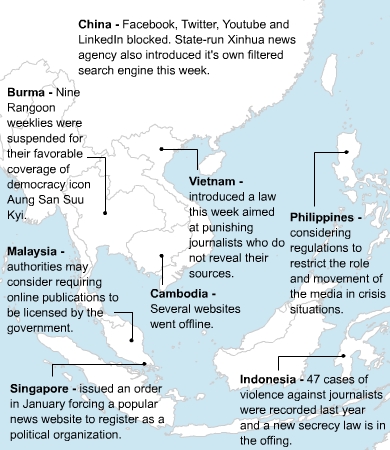




China and Southeast Asian nations may be knocking down trade barriers in their joint bid to forge the world's most populous free trade area, but they are also erecting barriers restricting information flow.
As the media play a pivotal role in fueling pro-democracy protests in the Middle East and North Africa, Beijing is moving rapidly to fortify its "Great Firewall" Internet censorship system while Southeast Asian governments are tightening online controls and curtailing press freedom.
China has to strengthen Internet "management" and establish mechanisms to "guide online public opinion," President Hu Jintao declared at a gathering of the top brass of the Chinese Communist Party last weekend, underscoring Beijing's anxiety over any spread of information that might challenge its one-party rule.
The Chinese do not have direct access to Facebook, Twitter, or YouTube. Access to the professional networking site LinkedIn has also been disrupted following online calls on other sites for gatherings inspired by protests elsewhere.
The state-run Xinhua news agency this week introduced a new Internet search engine that gives China's own sanitized view of the Web following Google's closure of its Chinese search engine last year over censorship.
Not taking chances

In Burma, where the military appears to be firmly in control despite the recent election of a civilian government, Ross Dunkley, the Australian editor of the English-language weekly the Myanmar Times, has been charged with breaking an immigration law and assaulting a woman.
Dunkley, who appeared in court in handcuffs, was denied bail on Thursday and was sent back to Rangoon's notorious Insein Prison. His friends have maintained the case is related to a long-running business dispute.
Dunkley told AFP that he was "fed up" but "OK" and said that he hopes to be deported.
Dunkley's arrest has raised fears among Burma's publishers that they too could be targeted by Burma's powerful military generals if they fall out of favor, said The Irrawaddy, a news website run by exiled Burmese journalists.
Nine Rangoon weeklies were suspended in November for up to two weeks for their favorable coverage of democracy icon Aung San Suu Kyi after her release from house arrest.
Online license
In Malaysia, where major newspapers and broadcasters are closely linked with the ruling coalition, the authorities are planning to tighten already strict laws on printing to include online content.
The chief civil servant in the powerful Home Ministry said last month that the country's Printing Presses and Publications Act, which requires all publications to be licensed by the government, will be amended to include online publications such as news portals and blogs which have become a lively forum for dissent and debate.
The statement drew strong protests from the opposition and media groups.
Home Minister Hishammuddin Hussein said later that discussions on the issue were in the "very early" stage. Malaysian officials had revealed previously that they were considering adopting a China-style Internet filtering system.
In neighboring Singapore, the government issued an order in January forcing a popular news website to register as a political organization, in a move viewed by some groups as designed to limit political commentary.
The action against the volunteer-run Online Citizen bars the website from receiving foreign donations. It is the first such action against a website in the tightly regulated island state and came ahead of possible elections this year.
Independent alternatives
CPJ said its research shows that Singapore's dominant ruling People's Action Party had "instigated" registrations in previous elections, to prevent online speech from becoming an independent alternative to the regular media, which is largely government-owned and heavily controlled.
“Discussing politics does not make a publication a political organization,” said Bob Dietz, CPJ's Asia program coordinator. “Forcing The Online Citizen to register as a political association distorts its role and threatens its ability to cover politics."
Even in more established democracies, there is no let-down in moves to restrict the media, the SEAPA media freedom group said.
"While Thailand and the Philippines, together with Indonesia, are the region’s strongest democracies, advocates have expressed concern over the trends of impunity, physical threats and legislative controls that could derail years of work to build a free and safe environment for the media to operate," SEAPA said in a report.
While an emergency decree has been lifted in Thailand, "there is still anxiety ... if the media will be able to operate without fear and favour," it said.
Violence
In the Philippines, uncertainty remains over the ability of the new administration under President Benigno Aquino to deliver on promises to end impunity, SEAPA said.
Following a hostage crisis in August last year in Manila in which nine people died, politicians are considering regulations to restrict the role and movement of the media in similar situations.
Four journalists were murdered last year in the Philippines, where many powerful people have local fiefdoms that are above the law, and 30 were killed in a massacre there in November 2009, said the Paris-based media watchdog Reporters Without Borders.
As many as 47 cases of violence against journalists were recorded last year in Indonesia, including the murder of a reporter, SEAPA said, warning of a new secrecy law in the offing in the largest Southeast Asian nation, home to one million blogs.
There is also a pending bill on mandatory online censorship that makes Internet service providers responsible for filtering content deemed blasphemous or defamatory, said Megi Margiyono, campaign manager of the Jakarta-based Alliance of Independent Journalists.
"The outlook for the year 2011 is generally not encouraging as there is little sign of political will to address impunity by the governments in the region or to endorse and push for media reforms," SEAPA warned.